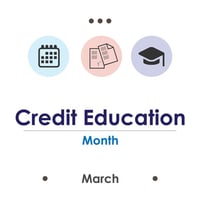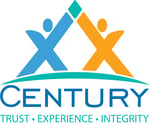As March National Credit Education Month nears; this presents an excellent opportunity not only to further your own awareness about credit —but to spread some of this valuable knowledge onto your own children and other youth in your life.

Teaching kids about credit early will help them build a foundation for responsible budgeting and spending, and help them learn about the financial burdens that can come with misusing credit. Read on to discover simple tips for teaching kids about credit.
Lesson 1: Credit Basics
Without a solid understanding of how financial decisions can affect credit, it’s very easy to make mistakes that can ultimately tarnish your credit and have a long-lasting impact on your life. You may already know this all-too-well, so by spreading awareness of credit education, you may be able to protect a child or another loved one from falling into a similar situation.
Unfortunately, according to the U.S. News & World Report, only 19 states across the country currently require students to take financial education classes. When teaching your kids about credit, it’s best to start with the basics. Get the conversation started by explaining how credit cards are borrowed money you can use to make purchases. Adults use them if they don’t have the exact amount when buying something; credit cards are also used to make large purchases and build overall creditworthiness.

There are also several terms that are associated with credit cards that you should teach your kids. Be sure to go over the following terms to ensure they understand the basics of credit, loans and debt:
- Credit limit
- Credit card balance
- Interest
- Credit card payments
- Credit report
- Credit score
Lesson 2: Credit Cards are not free money
Help your kids understand that when a money lender (bank) gives you a credit card, they tell you how much you’re allowed to borrow, which is called a credit limit. The more responsible you are with your credit card, the more they will lend you. If you do not pay back the borrowed money on time, you may have to pay a late fee on top of paying back what you’ve borrowed. These late fees are called interest and will increase until you completely pay back the borrowed money
Lesson 3: Wants Vs Needs

Help kids understand that credit cards are not free money and should only be used for needs or emergencies, instead of for things they want, so they can better maintain their financial health and creditworthiness in the long term.
When teaching your children about credit limits, simply explain that there is a certain amount that the bank or lender is willing to let a user borrow. The more responsible a customer is with their credit card and payments, the more credit the lender will be willing to offer in the future. Make sure your child understands that even if you have a lot of credit to spend, racking up big balances is risky because you may run out of credit and not have any more to spend before you pay all of your borrowed money back.
Lesson 4: Form Good Habits Early

Make sure you emphasize the importance of credit scores with your children and help them picture what types of hardships come with bad credit. It’s also a good time to check and review your own credit report while encouraging others in your life to do the same. Remember that you are entitled to one free copy of your credit report from each of the major reporting bureaus (Experian, Equifax, and TransUnion) each year.
When your teen has a job or is otherwise ready to have their own spending power, consider starting them off with their own credit card account or a joint account where they are an authorized user. This way you can monitor their activity and make sure repayments are made every month until they’re ready for full financial independence and responsibility. It’s a good idea to check in with them or check their credit scores every now and then to make sure they’re on track for good creditworthiness.
Teaching your children early on to be careful with their money, save for things that they want and pay back loans or debts right away will help them establish good financial habits for the future.
Observe National Credit Education Month this March, make an effort to speak with your children or other youth about the importance of credit literacy. Sharing your own experience and struggles can be helpful here (if that’s something you’re comfortable with) and may serve as a cautionary tale of sorts.
Many young people are falling into the same cycle of debt that previous generations have. They’re carrying high credit card debt balances, struggling to afford their monthly expenses, and suffering from low credit scores. Even those who have managed to remain reasonably responsible with their finances may not understand how to check their credit reports or dispute errors/mistakes on their reports.






